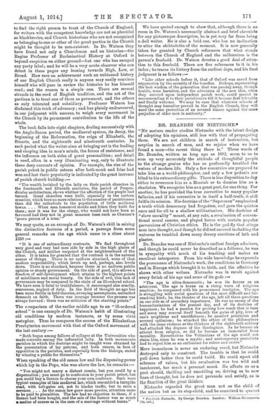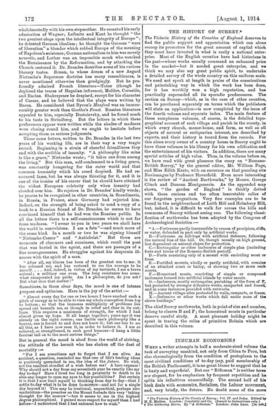DR. BRANDES ON NIETZSCHE"
"No mature reader studies Nietzsche with the latent design of adopting his opinions, still less with that of propagating them. We are not children in search of instruction, but sceptics in search of men, and we rejoice when we have found a man—the rarest thing there is." These words of Dr. Brandes, written as long ago as 1892, seem to us to
sum up very accurately the attitude of thoughtful people to the strange genius who has so profoundly troubled the waters of modern life. Only a few eccentrics are prepared to take him as a world-philosopher, and only a few pedants are blind to his extraordinary gifts. There is less disposition to-day either to reverence him as a Messiah or to dismiss him as a charlatan. We recognize him as a great poet, for one thing. For another, he has provided the true corrective to many popular fallacies, and if his corrective is in itself a half-truth, it still fulfils its mission. His doctrine of the "Superman" emphasized a truth which democracy had forgotten, and gave the quietus once and for all to a shallow utilitarianism. His doctrine of "slave morality" meant, at any rate, a revaluation of conven- tional moral canons, and played havoc with certain popular perversions of Christian ethics. He is the gad-fly that stings men into thought, and though he did not succeed in shaking the universe he tumbled down many dreary erections of lath and plaster.
Dr. Brandes was one of Nietzsche's earliest foreign admirers, and though he could never be described as a follower, he was in sympathy with much of his teaching and makes an excellent interpreter. From his wide knowledge he expounds the provenance of Nietzsche's work, the conditions in Germany and in Europe which brought it to birth, and the affinities he shows with other writers. Nietzsche was in revolt against every fetish of his age and some of its gods
"The age is ultra-democratic ; he won its favour as an aristocrat. The age is borne on a rising wave of religions reaction; he conquered with his pronounced irreligion. The age is struggling with social questions of the most difficult and far- reaching kind ; he, the thinker of the age, left all these questions on one side as of secondary importance. He was an enemy of the humanitarianism of the present day, and of its doctrine of happiness ; he had a passion for proving how much that is base and mean may conceal itself beneath the guise of pity, love of one's neighbour and unselfishness ; he assailed pessimism and scorned optimism ; he attacked the ethics of the philosophers with the same violence as the thinkers of the eighteenth century had attacked the dogmas of the theologians. As he became an atheist from religion, so did he become an immoralist from morality. Nevertheless the Voltairians of the age could not claim him, since he was a mystic ; and contemporary anarchists had to reject him as an enthusiast for rulers and castes."
Mere iconoclasm is never an enduring creed, but Nietzsche
destroyed only to construct. The trouble is that he could pull down better than he could build. He could upset old schemes of values, but his revaluation was too wild and incoherent, too much a personal mood. He affects us as a poet should, thrilling and unsettling us, driving us to new lines of thought, but be does not persuade and satisfy, as is
the function of the great thinker.
Nietzsche regarded the great man not as the child of the nation but as its step-child, and be contrived to quarrel
• Friedrich Nietzsche. By George Brander. London: William Heinemann. Ns. net.]
wholeheartedly with his own stepmother. He recanted his early admiration of Wagner; Leibnitz and Kant he thought " the two greatest clogs upon the intellectual integrity of Europe "; he detested German idealism ; he thought the German " wars of liberation" a blunder which robbed Europe of the meaning of Napoleon's existence; German nationalism to him was merely neurotic, and Luther was an impossible monk who wrecked the Renaissance by the Reformation, and by attacking the Church restored it. Dr. Brandes describes some of his curious literary tastes. Renan, to whose dream of a new Asgard Nietzsche's Superman doctrine has many resemblances, is never mentioned otherwise than grudgingly. But he pro- foundly admired French literature—Taine (though he deplored the traces of Hegelian influence), Moliere, Corneille, and Racine. Shakespeare he despised, except for his character of Caesar, and he believed that the plays were written by Bacon. He considered that Byron's Manfred was an immea- surably greater work than Goethe's Faust. Russian literature appealed to him, especially Dostoievsky, and he found much to his taste in Strindberg. But the letters in which these preferences appear were written while the shades of madness were closing round him, and we ought to hesitate before accepting them as serious judgments.
These same letters, written to Dr. Brandes in the last two years of his working life, are in their way a very tragic record. Beginning in a strain of cheerful friendliness they end with the scribble of insanity. "A philosophy like mine is like a grave," Nietzsche wrote ; "it takes one from among the living." But this man, self-condemned to a living grave, was constantly hungering for the outer world and that common humanity which his creed despised. He had re- nounced fame, but he was always thirsting for it, and it is one of the ironies of his career that he should have attained the widest European celebrity only when insanity had clouded over him. He rejoices in Dr. Brandes' kindly words; he yearns to be recognized in other countries, in Scandinavia, in Russia, in France, since Germany had rejected him.
Indeed, on the strength of being asked to send a copy of a book to a Russian friend of Dr. Brandes, he seems to have convinced himself that he had won the Russian public. In all the letters there is a self-consciousness which is not far from madness. "I swear to you in two years we shall have the world in convulsions. I am a fate "—and much more of the same kind. In a month or two he was signing himself " Nietzsche-Caesar " and " Antichrist." But there are moments of clearness and sunniness, which recall the poet that was buried in the egoist, and there are passages of a fine courageousness. He struggles against his desperate ill- nesses with the spirit of a man.
"After all, my illness has been of the greatest use to me: it has released me, and has restored to me the courage to be myself. . . . And, indeed, in virtue of my instincts, I am a brave animal ; a military one even. The long resistance has some- what exasperated my pride. Am I a philosopher, do you ask? But what does that matter !"
Sometimes, in these clear days, the mood is one of intense purpose and optimism. Here is the joy of the artist :-
" Almost every day for one or two hours I have reached such a pitch of energy as to be able to view my whole conception from top to bottom ; so that the immense multiplicity of problems lies spread out beneath me, as though in relief and clear in its out- lines. This requires a maximum of strength, for which I had almost given up hope. It all hangs together; years ago it was already on the right course; one builds one's philosophy like a bearer, one is forced to and does not know it; but one has to see all this, as I have now seen it, in order to believe it. I am so relieved, so strengthened, in such good humour—I hang a little farcical tail on to the most serious things."
But in general the mood is aloof from the world of striving, the attitude of the hermit who has shaken off the dust of
mortality:— "For I am sometimes apt to forget that I am alive. An accident, a question, reminded me that one of life's leading ideas is positively quenched in me, the idea of the future. No wish, not the smallest cloudlet of a wish before me! A bare expanse ! Why should not a day from my seventieth year be exactly like my day to-day ? Have I lived too long in proximity to death to be able any longer to open my eyes to fair possibilities? But certain it is that I now limit myself to thinking from day to day—that I settle to-day what is to be done to-morrow--and not for a single day beyond it! This may be irrational, unpractical, perhaps also unchristian—the preacher on the Mount forbade this very taking thought for the morrow'—but it seems to me in the highest degree philosophical. I gained more respect for myself than I had before—I understood that I had unlearnt how to wish."



































 Previous page
Previous page